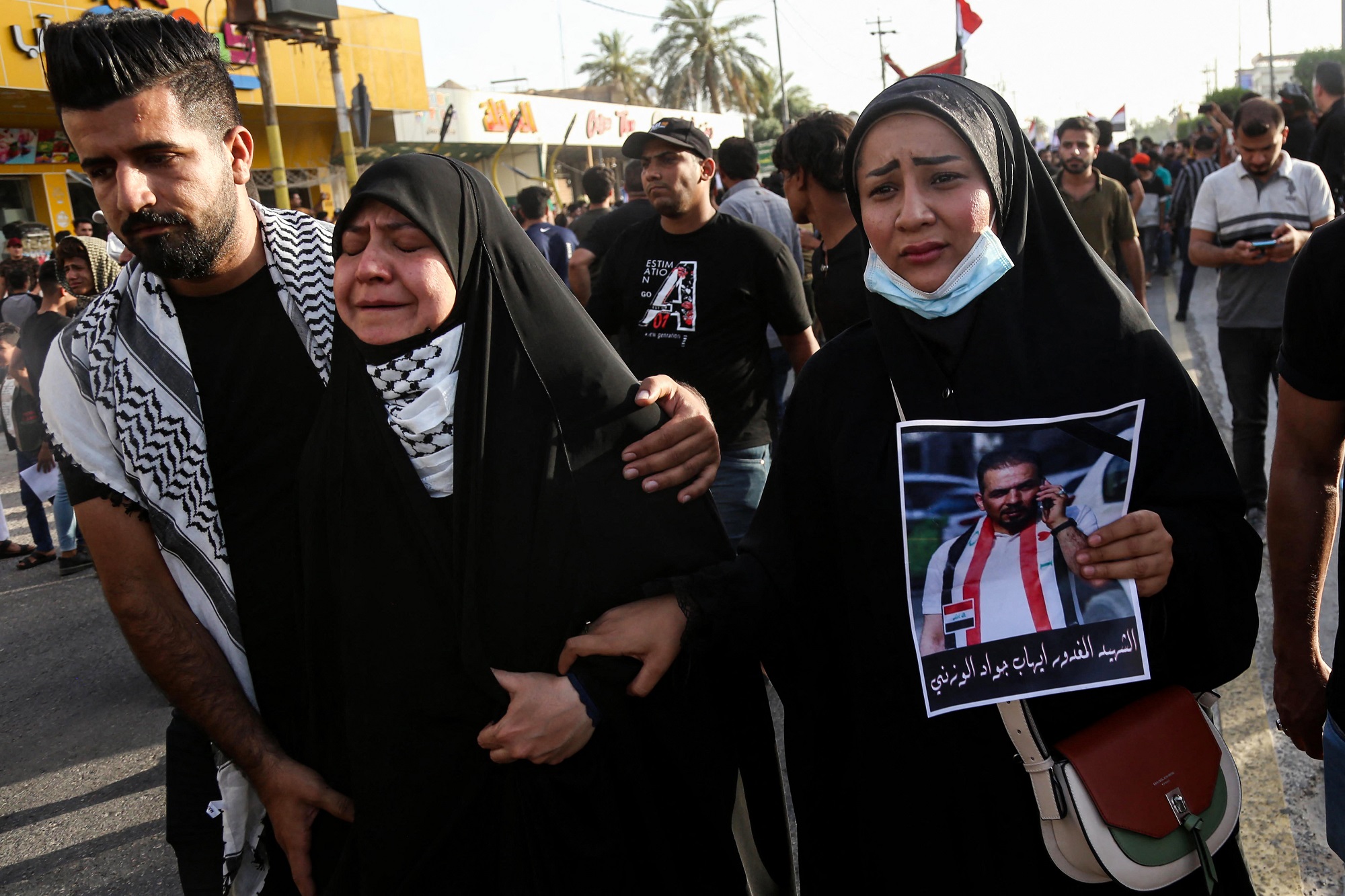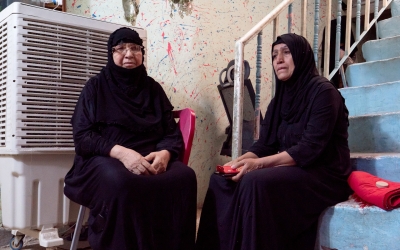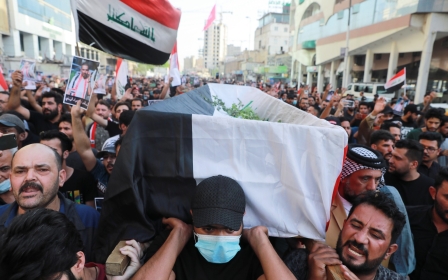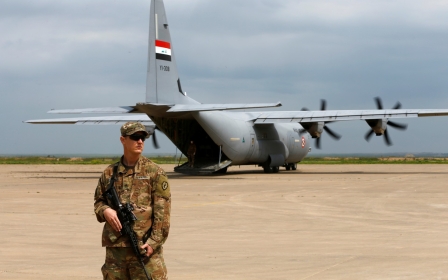Iraq: Protesters raise outcry after government fails to name activist's killers
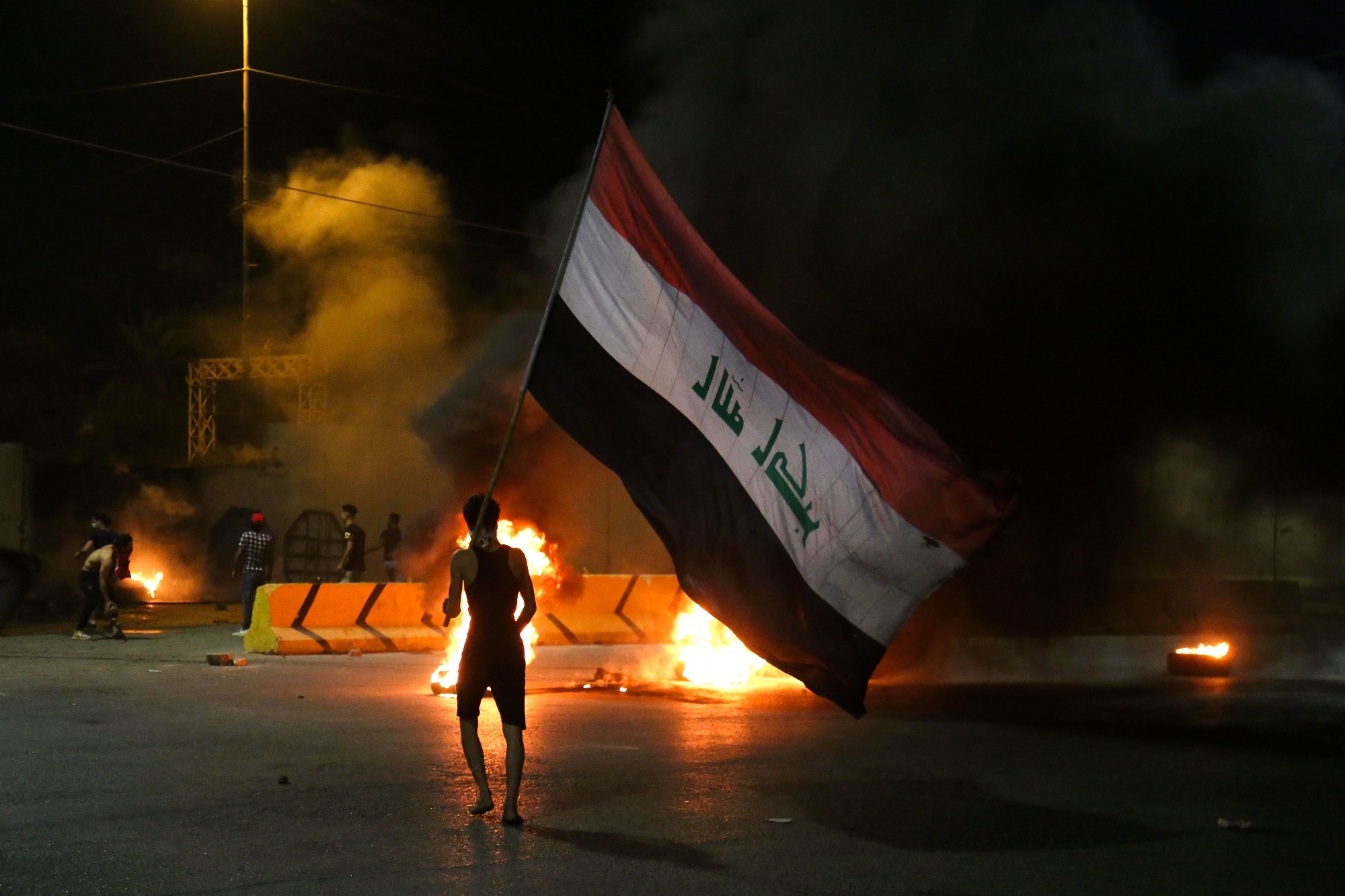
Protesters in Iraq's Karbala province and several other southern governorates say they will ratchet up demonstrations after government officials failed to name the killers of a high-profile activist assassinated last week.
Their calls for expanded protests over the killing of Ihab al-Wazni come as Iraq's top human rights agency warns of a "new wave" of targeted killings and a fresh assassination attempt on a journalist this week.
Early on Sunday, Wazni, a key organiser of the anti-government protest movement which first took to the streets in October 2019, was shot by gunmen on a motorbike in front of home in Karbala's city centre.
His murder, one of more than 30 targeted killings since 2019 of activists, journalists and protesters linked to the movement, has sparked massive protests.
Iraqi officials have repeatedly failed to charge or publicly identify suspects in these killings, while demonstrators have accused Iranian-backed armed groups of being involved.
New MEE newsletter: Jerusalem Dispatch
Sign up to get the latest insights and analysis on Israel-Palestine, alongside Turkey Unpacked and other MEE newsletters
Within hours of Wazni's killing on Sunday, hundreds of demonstrators attempted to storm the Iranian consulate in Karbala and torched a guard room in the complex.
The protesters gave Iraqi Prime Minister Mustafa al-Kadhimi 72 hours to name his killers, sack Karbala's governor and police chief and put both officials on trial for "colluding with the killers".
'If Kadhimi does not respond to our demands, we will move to the next step'
- Organiser in Karbala
"If Kadhimi does not respond to our demands, we will move to the next step, which is to start an open sit-in alongside the demonstrations," a prominent organiser in Karbala told MEE.
The organiser said demonstrators in the southern governorates were highly coordinated and would start sit-ins alongside Karbala if the killers' identities were not made public on Wednesday.
Over the previous two days, while Karbala was largely locked down by security forces, protesters elsewhere set fire to the headquarters of three separate groups: the Asaid Ahl al-Haq, a powerful armed Shia faction, in the city of Diwaniyah; the Islamic al-Fadhilah Party in the city of Hilla in the Babil governorate; and the Islamic Dawa Party in Najaf.
Fearing further violence, several governors have put security forces on high alert to guard party headquarters, security sources told MEE.
'Serious security setback'
Anti-government demonstrations over the lack of basic public services, unemployment and rampant corruption in government institutions began in October 2019, but were brutally suppressed.
Since then, the assassination and kidnapping of activists, demonstrators and journalists linked to the October demonstrations has become a frequent occurence, but the suspects are rarely, if ever, identified or prosecuted.
Since Wazni's death on Sunday, there have been three other incidents, including a failed assassination attempt, that have raised concerns of an increase in targeted killings:
- On Monday evening, Ahmed Hassan, a correspondent for al-Forat, a local TV channel affiliated with the al-Hikma movement, led by the Shia cleric Ammar al-Hakim, narrowly escaped an assassination attempt after gunmen shot him in front of his house in Diwaniyah, 180 km south of Baghdad. One of the bullets hit him in the head and he is currently in critical condition in intensive care.
- Also on Monday, two young men were killed in Wasit, a city 180 km southeast of Baghdad.
- On Wednesday morning, Imad al-Asadi, a business leader and a pariamentary candidate, was killed inside his home in the Tunis neighbourhood, east of the capital Baghdad, security sources said.
Initial information in both the killing of the two young men and of al-Asadi suggests the incidents were criminal in nature, but no official information relating to what motivated the crimes has been announced.
Late on Monday, the Iraqi High Commission for Human Rights (IHCHR) warned of "a new wave of targeting and assassinating activists, journalists, and opinion makers".
"The continuation of the scenario of assassinations, intimidation and restriction of opinion, with an increasing pace, matched by the inability of the security services... to uncover the perpetrators and stop the bloodshed, represents a serious security setback," IHCHR said in a statement.
The IHCHR has documented 82 assassination attempts against journalists, activists and protesters related to the anti-government demonstrations since October 2019, 34 of which were successful.
Calls for election delay
Although armed factions and political parties linked to Iran are usually suspected in the assassinations, the involvement of local political and tribal groups and other regional and international forces has also been questioned.
Iranian-backed political movements and armed factions blame the October protesters and their supporters for overthrowing the government of Adel Abdul Mahdi in November 2019, which was considered to be the closest government to them since 2004.
The assassinations that target the Tisharnna - the Octoberians, as they are called - are part of a settling of scores between the Tisharnna and the Iranian-backed factions, as they aim to intimidate them and prevent them from participating in the upcoming elections.
Regardless of their motive, the increase in assassinations and killings is evidence of the instability of the security situation in Iraq, and thus the early national parliamentary elections, scheduled for October, should be postponed or cancelled, say observers.
The British ambassador to Baghdad, Stephen Hickey, said in a televised interview on Monday that the security situation in Iraq was poor and that fair elections could not be held in such an atmosphere.
"Without protection for activists, there will be no chance for fair and transparent elections in Iraq," Hickey told Al-Arabiya.
'Everyone benefits'
Meanwhile, Kataeb Hezbollah (KH), one of the most powerful Iranian-backed Shia armed factions, and the associated Raba'a Allah group announced on Tuesday their readiness to protect the holy shrines in Karbala from "the igniters of sedition and (those who cause) the devastation and fighting in the central and southern governorates".
The faction also accused the UK embassies in Baghdad and Beirut of being involved in the attack on the Iranian consulate in Karbala, but did not elaborate with an explanation or details.
'Iran has nothing to do with these assassinations and does not support it'
- Senior Iranian-backed faction commander
These accusations have doubled concerns of officials and observers over a new wave of assassinations targeting the supporters of the demonstrations under the pretext of "conspiring with the British embassy this time".
This would not be the first time this has happened. Several activists who used to take part in activities organised by the British Council in Basra were killed in 2018 and 2019 after photos - including several which were fabricated - were published showing them taking part in the activities of the British Council, or posing next to the British Council.
Among those killed was Riham Yacoub, a doctor and activist, who was gunned down in her car in central Basra last August.
In an attempt to distance itself from accusations of Tehran's involvement in the targeted killings, the Iranian embassy in Baghdad issued a statement on Tuesday.
"The Islamic Republic of Iran has not and will not demand the killing or assassination of Iraqi citizens, and condemns in the strongest terms (these) terrorist acts," the statement said.
A senior commander of an Iranian-backed armed faction echoed the sentiment: "Iran has nothing to do with these assassinations and does not support it, especially now as it seeks calm in Iraq and the region for fear of disrupting its negotiations with the United States and Saudi Arabia," the commander told MEE.
"There is a clear confusion of cards with regard to the assassinations and there are many parties operating in Iraq, and it is not clear until now who is actually involved in these assassinations."
He added: "But if we talk about creating chaos, everyone benefits."
Middle East Eye delivers independent and unrivalled coverage and analysis of the Middle East, North Africa and beyond. To learn more about republishing this content and the associated fees, please fill out this form. More about MEE can be found here.


